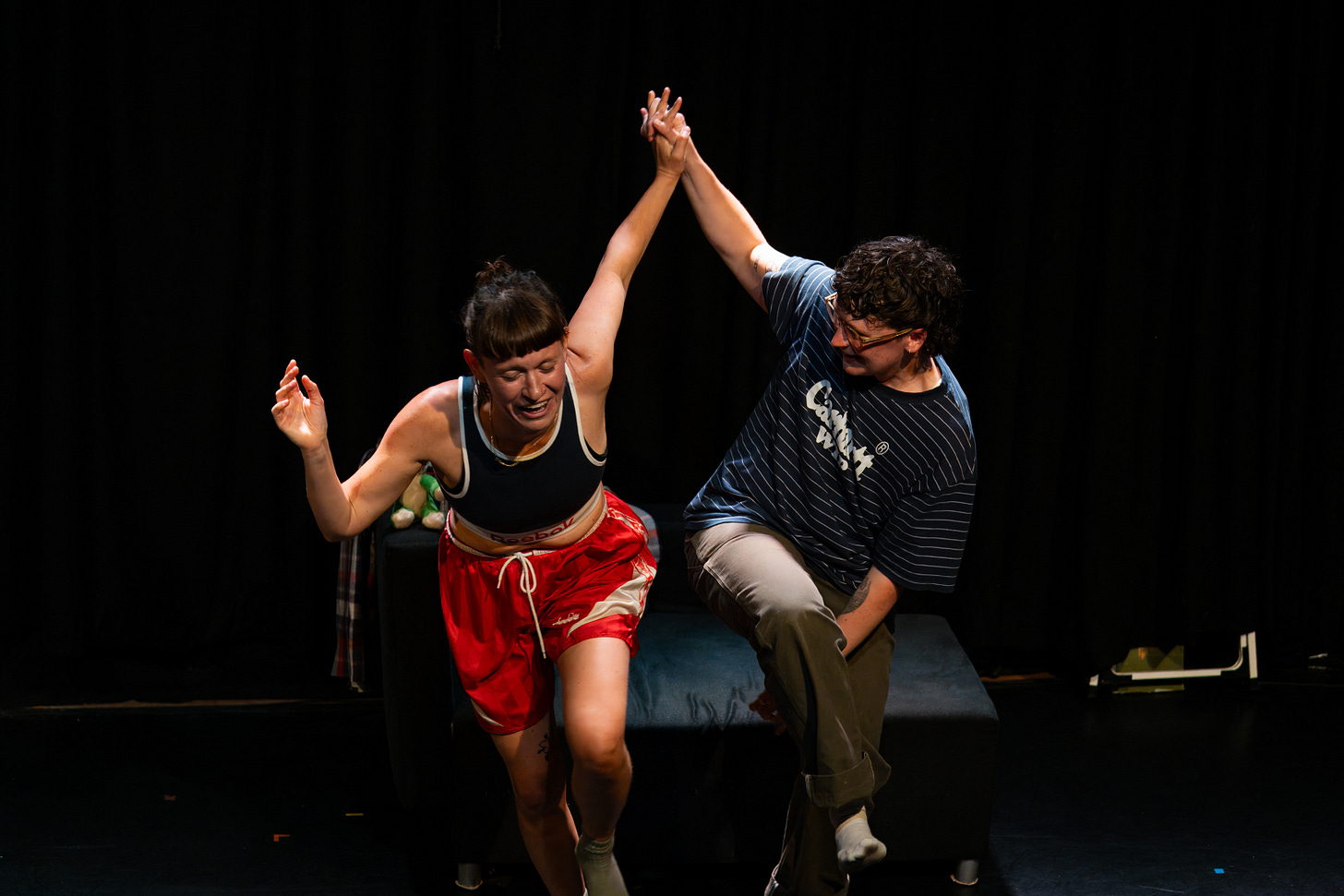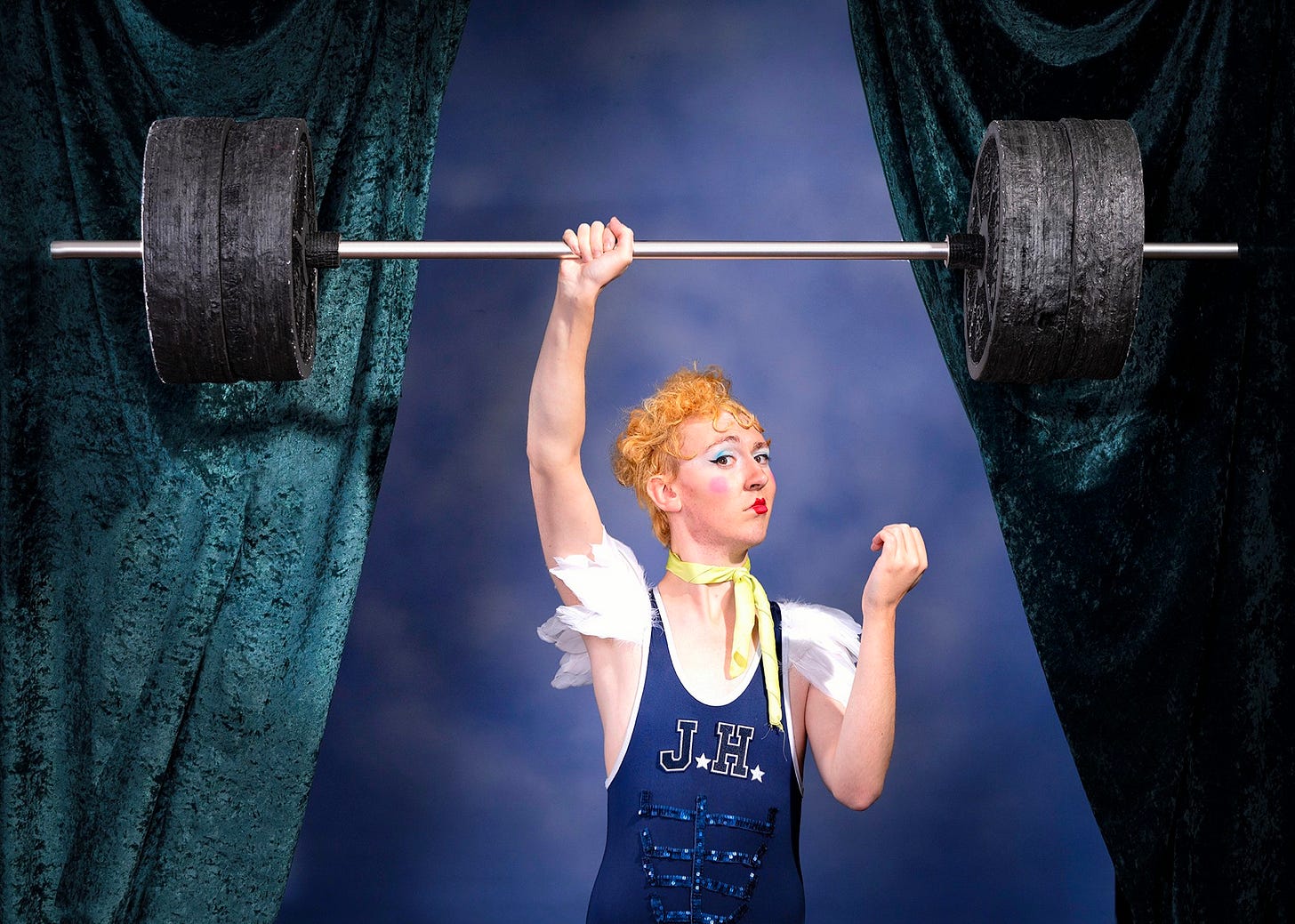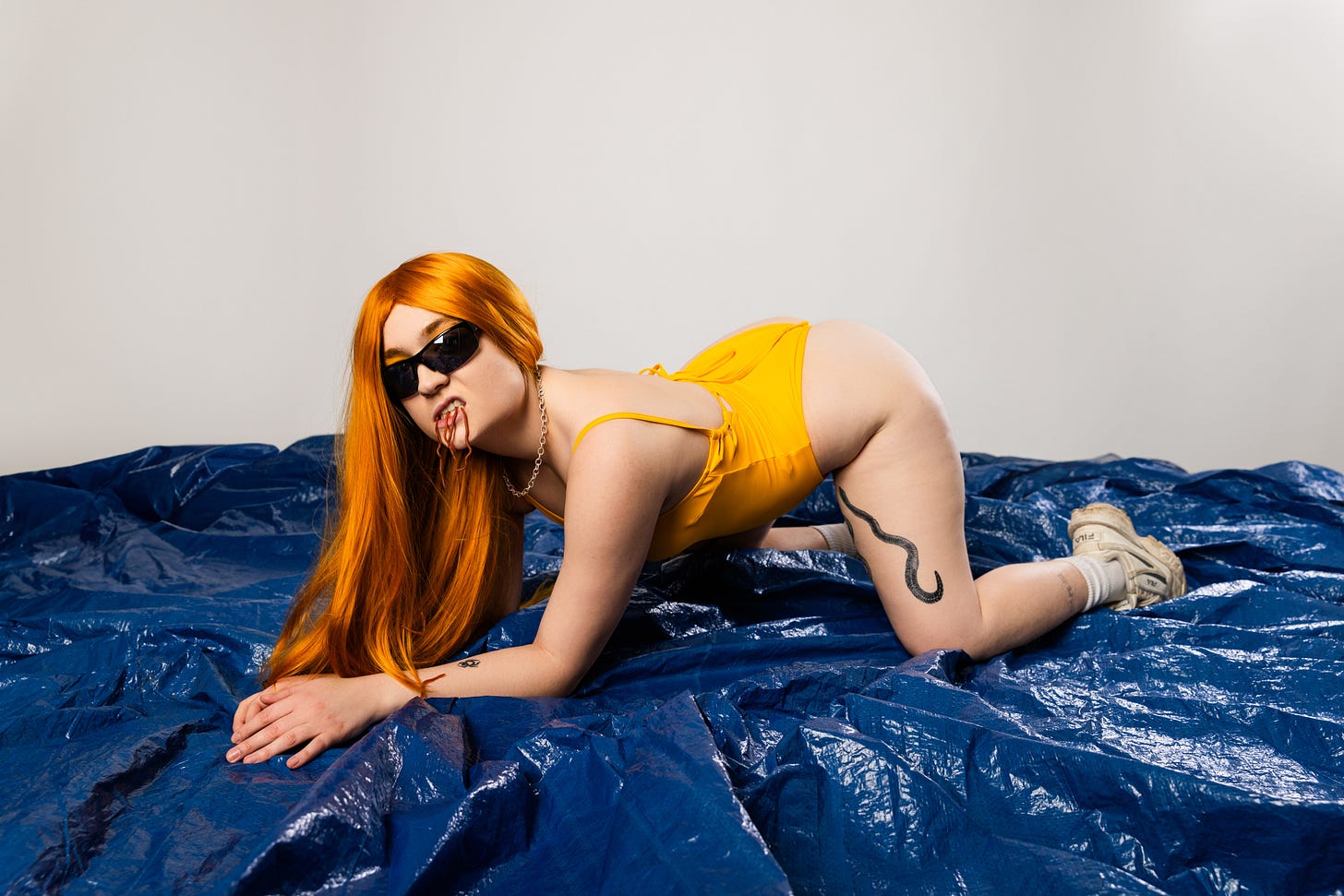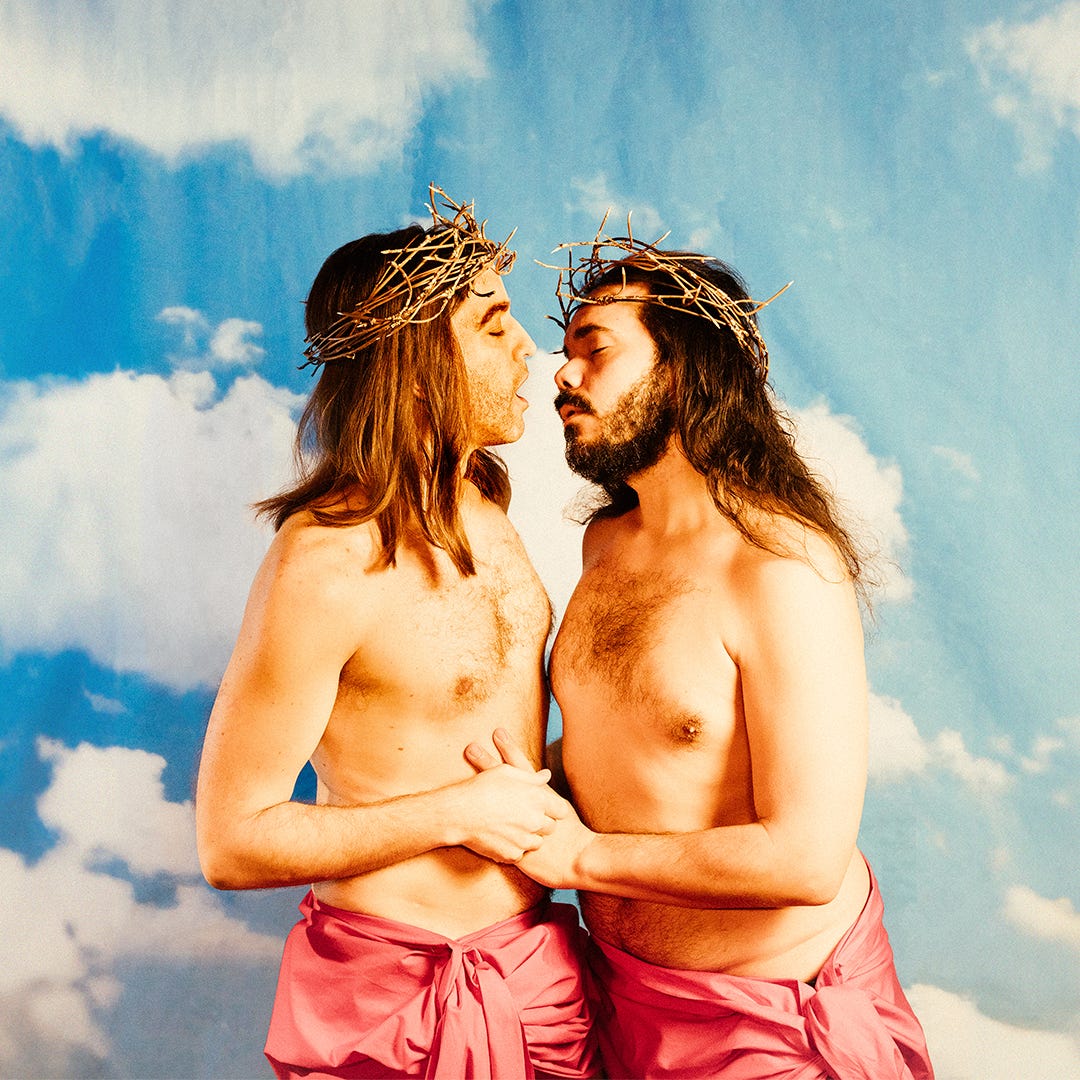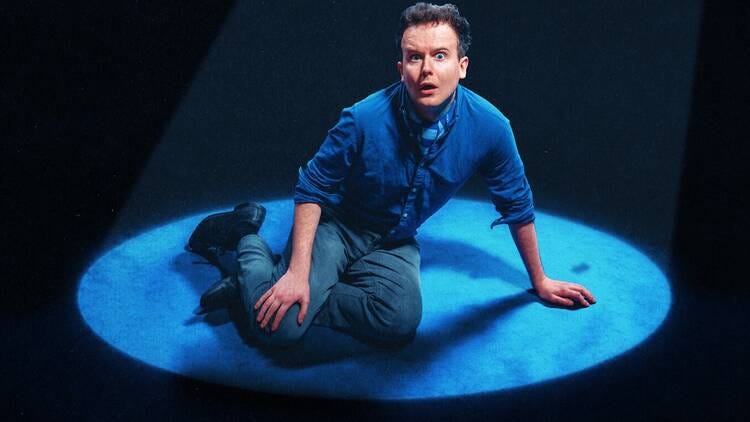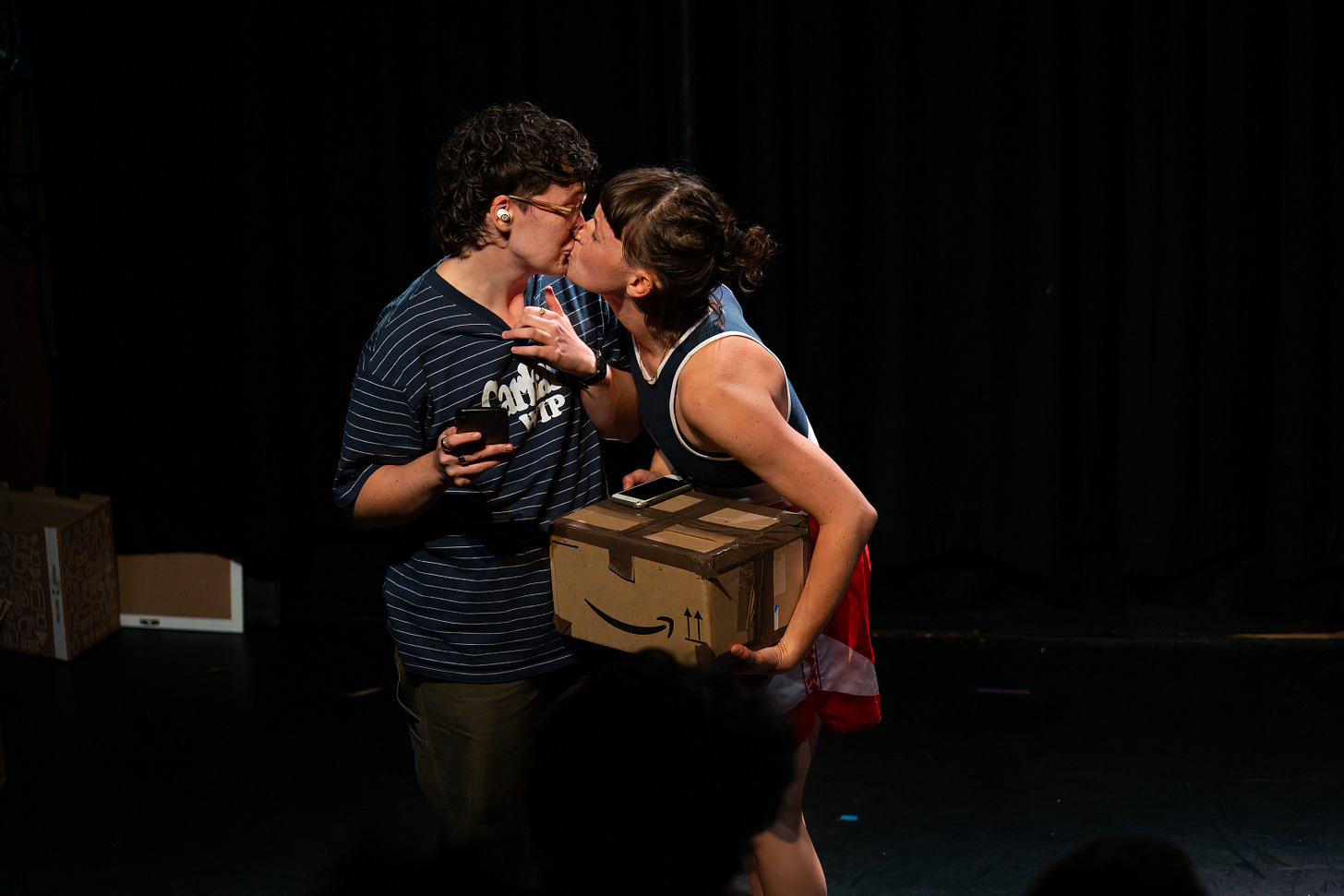I wipe the tip of my finger, the blood oath I just signed drying quickly. A man in a banana costume walks around with a bucket of bananas, handing them out to anyone who looks like they need them. The mediocre magic shows pile up and I’m waiting to be amazed. We dance wildly and it’s 10pm but feels like 2am. People dress as slugs, as penguins, as chickens, as ghosts. Shows are cancelled for the storm. A group of critics gather around with coffee, some typing, some talking, and it feels more like community in this odd job than I’ve experienced for a while. My friend says this show has converted him to the fringe. We get hot dogs on the way home.
Here’s part one of my recs for LGBTQ+ theatre at the Edinburgh fringe. Off we go for part two.
With its descent from cute camp into chaotic devil-shagging, Lachlan Werner’s Voices of Evil remains one of the funniest shows I’ve ever had the pleasure to watch. Aside from Nina Conti, the only ventriloquism I’d ever seen before this was old and stuffy and often oddly sleazy. Werner shifted that image for me, revealing how ventriloquism can be used in brilliant, bonkers storytelling.
I loved Anya Ryan’s recent piece illuminating the current boom in ventriloquism. Voices of Evil, Ryan writes, was written for Brew, Werner’s witch puppet, “which he had saved up for weeks to buy from a toy shop in Worcester when he was seven. “We’re like old friends,” he says. “I will talk to her off stage, and before a gig I’ll be like, ‘Are you ready?’”
WonderTwunk, Werner’s follow up to Voices of Evil, is a little looser in its construction, the set-up dragging before it begins to careen down with another manic idea, this time with thick stitches through fur and trails of fake blood. Directed again by Laurie Luxe, Werner plays Jack Hammer, the strongest boy in the world. He’s so strong that he can’t touch anyone without crushing them - or so his dad has always told him.
Our puppets this time around have grown, with Brew laid aside for a beautiful bouncing sea lion who dreams of freedom outside the circus he and Jack are trapped in. Freddie Hayes’ creations are gloriously expressive, particularly Jack’s dad, a menacing, gangling stretch of a man, with his bold striped suit, melting cheekbones and sinister red PVC gloves.
It may not be as quick and innovative as his first show, but WonderTwunk is still a hoot. Werner radiates awkward charm while his characters ooze a delicious mix of mischief and mystery.
Lachlan Werner: WonderTwunk, 21.50, 10 Dome at Pleasance Dome, until 24 August
Close your eyes and the image you’re left with is orange slime. The heavy, sunny gloop dollops over Rosa Garland’s hair, covers her eyes and blobs over her nose. It drips into her mouth and worms its way over her shoulders and she begins to rub it, slowly, stickily, into her skin.
Trained at Ecole Philippe Gaulier, Garland (of Trash Salad, and a founding member of Poltergeist Theatre) knows how to hold the audience’s gaze. She doesn’t offer a hand to ease us into the show. She just wants us to watch. To sit with our confusion and laughter as she slithers across the tiny box stage while she tries to figure out how she ended up in front of us when she simply wandered out here to take a piss.
Worms, canoes and obscure clips from the internet follow. The live tattooing, the tinge of audacity for which has been a big draw for this show, demands patience from her audience, while her leg is cleaned and prodded with ink.
The link to desire is sometimes hard to see through all that muck, but there is something inherently physical and tactile in the way Garland makes this mess, as if accessing what she likes comes through unexpected channels, some hard-won and some entirely accidental. As if you need to make peace with the mess to find the pleasure in it.
Rosa Garland: Primal Bog, 21.50, Downstairs at Assembly Roxy, until 24 August
“Should I be repenting or follow what’s tempting?”
With luscious locks, the holiest nipple tassels around, and a bulging purple crucifix that serves as Chekhov’s sexy gun, Sergio Antonio Maggiolo and Guido García Lueches have created a sweetly subversive musical. Daft and light-hearted despite the heavy Catholic guilt it carries, Jeezus! sashays its way into the conflict between queer love and religion.
Irreverent high camp reigns for these winners of the UnTapped Award, with songs that summarize the political history of Peru and mark teen Jesus’ discovery of desire at the same time as being told that what he wants is a mortal sin. This is a story of daddy issues and political unrest, of homophobia within Catholicism and the unquashable yearning of youth. But it’s told with such puppyish charm that it feels almost cosy. In one shining moment, the duo’s bodies take the forms of religious paintings, skin glimmering in the stage lights, limbs slowly shifting from one position to the next.
Packing in a huge amount of history and presenting it with bounding energy and a keen sense of the ridiculous, these joyously blasphemous storytellers take a light-touch approach to plot and a fuck-it attitude to the finale, which delights in its outrageous happy ending.
JEEZUS!, 18.50, Belly Button at Underbelly, Cowgate, until 24 August
Andrew Doherty: Sad Gay AIDS Play
It’s a tragedy. The Arts Council won’t let Andrew Doherty make the gaudy reality TV show he wants to make. He’s gay so, they say, he should make a play about AIDS instead.
Doherty, playing a weedy, clueless version of himself, gives into their increasingly demonic demands, in what becomes a send-up of The Arts Council more than the tropes of the plays he’s supposedly pastiching. Both draw knowing laughs, as Doherty gives a well-crafted and solidly entertaining performance, a roll-credits moment every time the title of one of the sad gay AIDS plays crops up.
As he starts to realise the impossibility of his position, Doherty has a brilliantly resigned looseness, giving up and giving in while he puts on the ever-more manic performance the funders want to see. If the satire feels comfortable rather than cutting-edge, I can imagine this will be a deeply cathartic watch for the many artists who have faced rejection at ACE’s hands.
Andrew Doherty: Sad Gay AIDS Play, 20.30, 10 Dome at Pleasance Dome, until 24 August
My friend said watching this show was like watching your friends fighting, in that aching way where you just want them to stop and work it all out. Bracing myself, I hadn't quite realised how much it would feel like watching a version of myself.
I couldn’t shake how much I related to Jo, softly played by Zoe West. We meet them in the build-up to trying for a baby with their partner, Lena (Stella Marie Sophie, who co-created the show with Sammy J Glover, director of the extraordinary The Last Show Before We Die). Jo can’t shake the terror that goes hand-in-hand with the excitement of it all. They’re anxious that this isn't the right time: when they're moving, when they're arguing, when they're not communicating well. I felt all Jo’s wants and reservations as clearly as if they were drawn onto their skin.
When Lena snaps at them, Jo's response is to shut down. The words to express how they're feeling or what they need evade them and trips them into a conversation that spirals downwards, with neither able to offer what the other needs. I found Lena’s character much harder to like, but perhaps that’s an instinctive response to knowing I’d never be able to handle her sharpness, the way she lashes out when she’s upset.
Lena is the one planning on birthing this potential baby. She’s the one ready to go through the changes and struggles and the physical hell. Sophie plays her astutely, but for me, her character is a springboard to understanding Jo's feelings as the one on the outside. I’ve long been more drawn to the other partner in these situations, the one who holds the hand of the one whose belly grows.
In the heat of an argument, when their long-held plans are on trembling ground, Jo says: sure, being the person who gives birth is about Lena’s body. Being pregnant is about Lena’s body. But being the person who doesn't give birth, who is preparing to be a parent while two other people actually make that child - that is about Jo’s body too. That speech shot through me, the articulate explanation of floating on the edge of an experience that will transform your life. The distance of it, the cavern that must be crossed.
Kate Davies’ thorny Nuclear Family. Eva Balthasar’s haunting Boulder. Like this show, those novels circle the complex feelings of the other parent, the one who knows the baby won’t grow in their body - who doesn’t want them to grow in their body, but who still feels all of these decisions in their bones. It’s these discussions around the choices of queer pregnancy and parenthood that fascinate me. The confronting conversations that a queer couple with two sets of one half of the apparatus to cook up a child must have. Baby in the Mirror is a quiet, thoughtful contribution to that emotionally and logistically complex world.
Baby in the Mirror, 15.15, Red Lecture Theatre at Summerhall, until 24 August
Coming soon: a seriously sexy fringe show that got a lot of Tory knickers in a twist. Plus, old stories being given new life.



